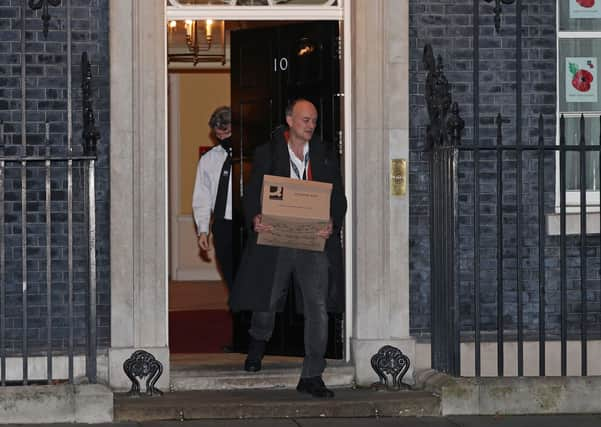Dominic Cummings still wields this power in politics – Matthew Flinders


Cummings has not gone. He’s just re-entered the political shadowlands from whence he came. Just as the notion of the “Boris bounce” has come to encapsulate the Prime Minister’s capacity to rise from the ashes, I expect a “Cummings comeback”.
The “return of the Dom” will undoubtedly be a relatively off-stage affair but that was arguably always the way he felt most effective. Hurling abuse, throwing threats, chucking rocks over the wall and waiting to hear the sound of smashing glass. Standing in the margins, shirt untucked and shabby shoes, looking to unleash his latest dose of creative disruption.
Advertisement
Hide AdAdvertisement
Hide AdThe “Boris and Dom” partnership was always going to be a fairly volatile affair. Both needed what the other had to offer and became trapped in an almost parasitical relationship, the strength of which looked almost bizarre when the Prime Minister protected his master of menacing after he’d taken an ill-judged and publicly damaging trip to Barnard Castle. The legacy of that trip cast has cast a long and dark shadow over public confidence in the Government and yet, like a political version of Tammy Wynette, Boris stood stubbornly by his man.


Why did Boris appear to be so dependent on Cummings? The answer, I suggest, exists in the personality of the Prime Minister. Boris is a man who needs to be loved. He hates to be the bearer of bad news and he cannot stand direct confrontation. Boris and Cummings made an odd but at least understandable duo. It was good-cop-bad-cop. Cummings ruffled the feathers, came up with ideas and had an interest in “managing the machine” of Whitehall; Boris liked to build people back up, had a lot on his mind (personally and professionally) and has never had any interest at all in the procrustean realities of making government work.
And apparently in the wake of Cummings’s departure the Prime Minister is about to love-bomb the environment, the north of England and Tory backbenchers as part of what has been variously characterised as a “reset”, “fresh start” or “new chapter”.
Whether the European Union will benefit from this more “sharing, caring, listening approach” is more doubtful. What is less doubtful is that in politics “love costs” and, with the national debt already heading to eye-watering levels, the Prime Minister’s room for manoeuvre is limited and the stresses and strains with the Chancellor are increasingly obvious.
Advertisement
Hide AdAdvertisement
Hide AdAnd what about the Cummings comeback? Why am I so sure that the permanent secretaries in Whitehall and the Conservative MPs of Westminster might have been a touch too premature in celebrating Dom’s departure?
The first reason is because in a lot of areas Dominic Cummings was correct. Many of the issues and themes that he sought to raise – about, for example, institutional churn, the need for new skills, the existence of implicit biases and a generally risk-averse culture – are all valid issues which have become more obvious in light of the Covid challenge. It was the way he raised these issues and the manner in which he adopted a supercilious tone mixed with technological fervour that undermined his capacity to actually deliver change.
The second reason that Cummings is likely to remain on the political landscape is because his thinking is embedded in a number of projects that have already developed a degree of momentum. Ministers appear committed to establishing a new £800m Advanced Research Projects Agency which was a Cummings brainchild; while the think-tank GovernUp is midway through a national Commission on Smart Government that is explicitly focused upon many of Cummings’ arguments about the potential of technology, big data and algorithmic governance.
Extracting Cummings from No 10 is likely to be far easier than extracting his thinking and influence from the wider state structure.
Advertisement
Hide AdAdvertisement
Hide AdAnd then, of course, there is the man himself – whether you love him or loathe him, it’s hard to admit that somewhere deep inside a complex mind is an unquestionable talent for disruption. And now that talent is super-charged with a detailed knowledge of the dysfunctionality of Whitehall and the personal frailties of the Prime Minister. Prepare yourself for the Cummings comeback.
Matthew Flinders is a professor of politics at the University of Sheffield.
Support The Yorkshire Post and become a subscriber today. Your subscription will help us to continue to bring quality news to the people of Yorkshire. In return, you’ll see fewer ads on site, get free access to our app and receive exclusive members-only offers. Click here to subscribe.
Comment Guidelines
National World encourages reader discussion on our stories. User feedback, insights and back-and-forth exchanges add a rich layer of context to reporting. Please review our Community Guidelines before commenting.